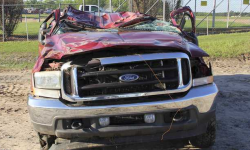
— A Ford Super Duty roof collapse class action lawsuit alleges all 1999-2016 Ford F-250, F-350, F-450 and F-550 Super Duty roofs are weak and dangerous.
The Ford truck owners who sued call their trucks "ticking time bombs," something Ford argues is absurd.
Numerous class actions were filed following a $1.7 billion Georgia jury verdict against Ford in the 2014 deaths of Melvin Hill, 74, and his wife Voncile Hill, 62.
The couple were killed in a 2002 Ford F-250 Super Duty crash caused by a blown tire that was the incorrect size.
The tire had been installed by a Pep Boys service center, and when the tire blew out, the Ford Super Duty truck violently rolled over two-and-a-half times and landed on its roof. (The Hill's truck is pictured above)
Ford says in the Hill case, "the jury was peremptorily instructed that Ford was liable and essentially told to award punitive damages without any evidence that the vehicle was in fact defective."
The first Ford Super Duty roof collapse class action lawsuit was filed just weeks after the $1.7 billion jury verdict, a verdict which as been appealed by Ford.
And as is common with large class actions, the lawsuits were consolidated, beginning with Beck v. Ford and Rhodes v. Ford.
Finally, Ryan Scott v. Ford, Steven Beck v. Ford, and Curtis Bright v. Ford were consolidated into, "In re Ford Super Duty Roof-Crush Litigation."
The subject even caused a Canadian Ford Super Duty roof collapse class action lawsuit.
Motion to Dismiss the Ford Super Duty Roof Collapse Lawsuit
The Ford roof-crush class action alleges more than 5 million trucks are equipped with weak roofs, and injuries and deaths have occurred in about 80 rollover crashes since 1999.
However, Ford argues all the claims are nonsense and should be thrown out, beginning with the fact none of the owners who sued allege their Super Duty trucks have been involved in a crash in which the roof collapsed.
One plaintiff does contend his son crashed a 2000 Ford F-250 Super Duty in August 2011, allegedly causing the roof to crush and collapse. However, the plaintiff doesn't claim there were any injuries from the crash. In addition, the plaintiff later purchased another earlier model year Ford Super Duty truck which he continues to use.
Yet the plaintiff asserts the weak roof makes the truck unfit for its intended purpose of providing transportation.
Ford also argues the plaintiffs claim they didn't know about the allegedly defective truck roofs until the Hill v. Ford verdict. But Ford told the judge, "the Hill allegations were public record long before the aberrant and unlawful verdict" from a lawsuit that was filed in 2016.
According to the lawsuit, Ford should have designed the trucks with a roof with a higher strength-to-weight ratio. But Ford says the trucks, some which have been on the road 25 years, all passed federal safety standards.
Ford points out how the huge Super Duty roof collapse class action lawsuit never claims any of the trucks failed to meet federal roof-strength standards. And Ford argues no allegation is made that Ford misrepresented the strength of the roofs.
"Of course, the roof of every vehicle could be made stronger. But a roof that could be stronger—which again, is every roof—does not warrant a lawsuit, let alone this putative nationwide class action of uninjured owners. Plaintiffs allege no plausible injury." — Ford
According to Ford, the plaintiffs fail to plausibly allege they overpaid for their Super Duty trucks because they do not allege Ford promised them anything they did not receive.
Ford also argues the plaintiffs lack standing to bring nationwide claims because the plaintiffs are from 20 states, meaning the plaintiffs cannot "assert claims arising under the laws of 30 other states unconnected to their purchases."
In its motion to dismiss the lawsuit, Ford says although the plaintiffs claim they do not feel safe in their trucks, none of the plaintiffs say they have stopped driving them.
“[S]imply because the product does not incorporate features that would make it safer, does not mean that the product is necessarily unsafe.”
The plaintiffs allegedly only focus on the risk of injury in "hypothetical rollover crashes."
"At most, Plaintiffs allege that the purported defect could cause them future harm in a rollover crash. But no such harm has occurred. And it would be improper to award damages to Plaintiffs and other Super Duty owners merely because they might be involved in a rollover crash, which might cause the roof to crush, which might cause them injury." — Ford
Ford also references three other Ford Super Duty roof collapse personal-injury lawsuits in which three juries reached verdicts in favor of Ford.
The Ford Super Duty roof collapse class action lawsuit was filed in the U.S. District Court for the Eastern District of Michigan: In re Ford Super Duty Roof-Crush Litigation.




